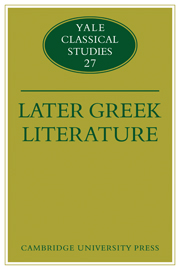Book contents
- Frontmatter
- Contents
- Introduction
- Theme, structure and narrative in Chariton
- The importance of sophists
- Lucian: a sophist's sophist
- The mendacity of Kalasiris and the narrative strategy of Heliodoros' Aithiopika
- The Emperor Julian on his predecessors
- Greek translations of Latin literature in the fourth century A.D.
- The empress and the poet: paganism and politics at the court of Theodosius II
- Pastiche, pleasantry, prudish eroticism: the letters of ‘Aristaenetus’
- The date and purpose of the Philopatris
Greek translations of Latin literature in the fourth century A.D.
Published online by Cambridge University Press: 06 December 2010
- Frontmatter
- Contents
- Introduction
- Theme, structure and narrative in Chariton
- The importance of sophists
- Lucian: a sophist's sophist
- The mendacity of Kalasiris and the narrative strategy of Heliodoros' Aithiopika
- The Emperor Julian on his predecessors
- Greek translations of Latin literature in the fourth century A.D.
- The empress and the poet: paganism and politics at the court of Theodosius II
- Pastiche, pleasantry, prudish eroticism: the letters of ‘Aristaenetus’
- The date and purpose of the Philopatris
Summary
Horace's familiar aphorism Graecia capta ferum victorem cepit (Epistles 2.1.156) neatly summarizes two obvious and important aspects of Graeco-Roman relations in antiquity: the Greeks accepted Roman political supremacy, but the Romans acknowledged, even welcomed, Greek cultural pre-eminence. The numerous histories and handbooks of Latin literature bear out Horace's observation with countless examples of Roman dependence upon Greek models, commencing with Livius Andronicus' Latin translation of the Odyssey (third century b.c.). We know, moreover, that outside strictly literary circles many cultivated Romans were thoroughly hellenized. Among the acquaintances of Pliny, for example, Terentius Junior, a retired Roman administrator, was fluent in Greek and so well read that ‘one would think he lived in Athens’ (Pliny, Epistles 7.25); the Greek compositions of Arrius Antoninus prompted Pliny to exclaim, ‘Can a Roman really write such Greek? Athens herself, I am sure, could not be as Attic’ (Epistles 4.3). Greek speakers, on the other hand, apparently avoided acquaintance with Latin culture. No cultivated Greek has been pronounced by his contemporaries ‘as Latin as Rome’, and several generations of scholarly enquiry into the attitudes of Greeks toward Rome have discouraged us from ever expecting to find such a person. That Greek speakers were indifferent to any language and literature but their own has become virtual dogma. In this paper I hope to demonstrate that this view ignores significant evidence to the contrary.
- Type
- Chapter
- Information
- Later Greek Literature , pp. 173 - 216Publisher: Cambridge University PressPrint publication year: 1982
- 2
- Cited by



